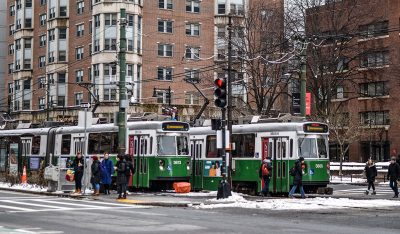
Public transit is the most common commuting method for Boston University employees, BU officials said.
Of BU’s more than 10,000 employees, 42 percent take mass transit to work, Billy Hajjar, the director of Parking and Transportation Services, wrote in an email. Driving alone is the second most common method at 29 percent, followed by walking at 21 percent and carpooling at 8 percent.
“Fewer employees driving alone to BU means safer, less congested streets,” Hajjar wrote, “and less of our valuable land devoted to storing cars.”
The recent Boston Globe Spotlight piece “Seeing Red” brought attention to Boston’s stifling traffic problem. One factor of the city’s congestion comes from the incentives employers give their workers to choose one transportation mode over another.
BU employees and students have access to the BU shuttle, free bike helmets, personalized commuting assistance and discounted Bluebikes memberships, Hajjar wrote. Permanent BU employees receive subsidies for 50 percent of the price of monthly MBTA passes.
Although transportation benefits vary among institutions, public transit subsidies are the primary benefit that most employers offer, Hajjar wrote. Local universities MIT and Harvard provide MBTA bus, subway and commuter rail pass subsidies.
MIT has the most generous transit subsidy program of any Boston-area college — giving all employees free subway and bus passes and a 50-60 percent subsidy for the commuter rail, according to The Boston Globe.
In 2016, MIT found that 48 percent of employees took public transit to work, while 25 percent drove alone.
Building permit applicants in Boston are required to commit to certain “Transportation Demand Management” measures before constructing infrastructures that could induce travel demand and add to traffic congestion, Hajjar wrote.
“We regularly consult with industry-leading transportation and mobility experts, attend national conferences, and maintain friendly relationships with counterparts at other institutions,” Hajjar wrote. “Parking & Transportation Services keeps on top of best practices and continues to enhance and tailor our transportation programs accordingly.”
These benefits also help BU recruit the best possible faculty and staff while simultaneously reducing carbon emissions and helping BU reach its Climate Action Plan goals, Hajjar wrote.
“Our employee transportation benefits — particularly transit subsidies — have played a key role in a dramatic reduction in drive-alone trips to campus,” Hajjar wrote. “[We had] a 32% drop between 2014 and 2018 based upon our surveys conducted for the Commonwealth’s DEP Rideshare Program.”
Jack Harris, a graduate teaching fellow at BU, said he mostly commutes to campus daily from Brookline Village by riding the T.
Harris said graduate teaching fellows receive a discounted semesterly MBTA train and bus pass, but do not get the 50 percent subsidy that full-time employees have.
“Unfortunately they’re not better than the benefits offered to students,” Harris said. “Frankly, I know that other grad schools that employ teaching fellows, like myself, give better [price] breaks.”
Employees like Harris are also given parking permits at discounted rates; however, parking is still pricey, Harris said.
Harris said providing employees with transportation benefits is important because it will encourage faculty and professors to commute via public transportation, reducing their carbon footprint.
“There is a wealth of data showing that the more [employees] utilize transportation benefits, on a smaller scale of carpools and on a larger scale of buses and mass transit, the smaller our carbon footprint will be,” Harris said.
By being reimbursed for transportation, professors and staff would be more available to their students outside of the classroom, Harris said.
“If I know that I have, at no extra cost, the ability to zip over to campus without much issue, that increases my face time with my students and makes me better at my job,” Harris said.
Kawas Aga, a sophomore in the School of Hospitality Administration, said transportation benefits help employees that live outside of Boston commute to work.
“Faculty and professors come from different ends of the state or the New England area and I think it’s important to give them some sort of transport compensation,” Aga said. “[This will] ensure that they are happy with their commute.”
Jon Ollom, a senior in the College of Communication, said having transportation benefits other than transit is important because public transportation is not always reliable.
“Because the public transportation system in Boston is not great,” Ollom said, “I think [transportation benefits] will definitely help people who work in other parts of the city who have a difficult time getting this campus.”
Ollom lives off-campus and commutes to his job as a COM ambassador, but does not have access to extensive employee transportation benefits as a student.
“I’m also a student so it’s not really like I was expecting to [receive transportation benefits],” Ollom said. “Still, my commute isn’t a five minute walk, it’s a 45 minute walk.”
Danae Gaytan, a freshman in the College of Arts and Sciences, said she has always received employee transportation benefits wherever she worked.
“I worked in an aquarium and we always had transportation benefits,” Gaytan said. “Our parking was always covered and validated, which was really nice because I never had to worry about paying any fees.”
Gaytan said transportation benefits will help employers be on time for work.
“The traffic in Boston is awful,” Gaytan said, “so I could see how that could be a hindrance considering that most people don’t live in Boston and they have to commute a long way.”























































































































